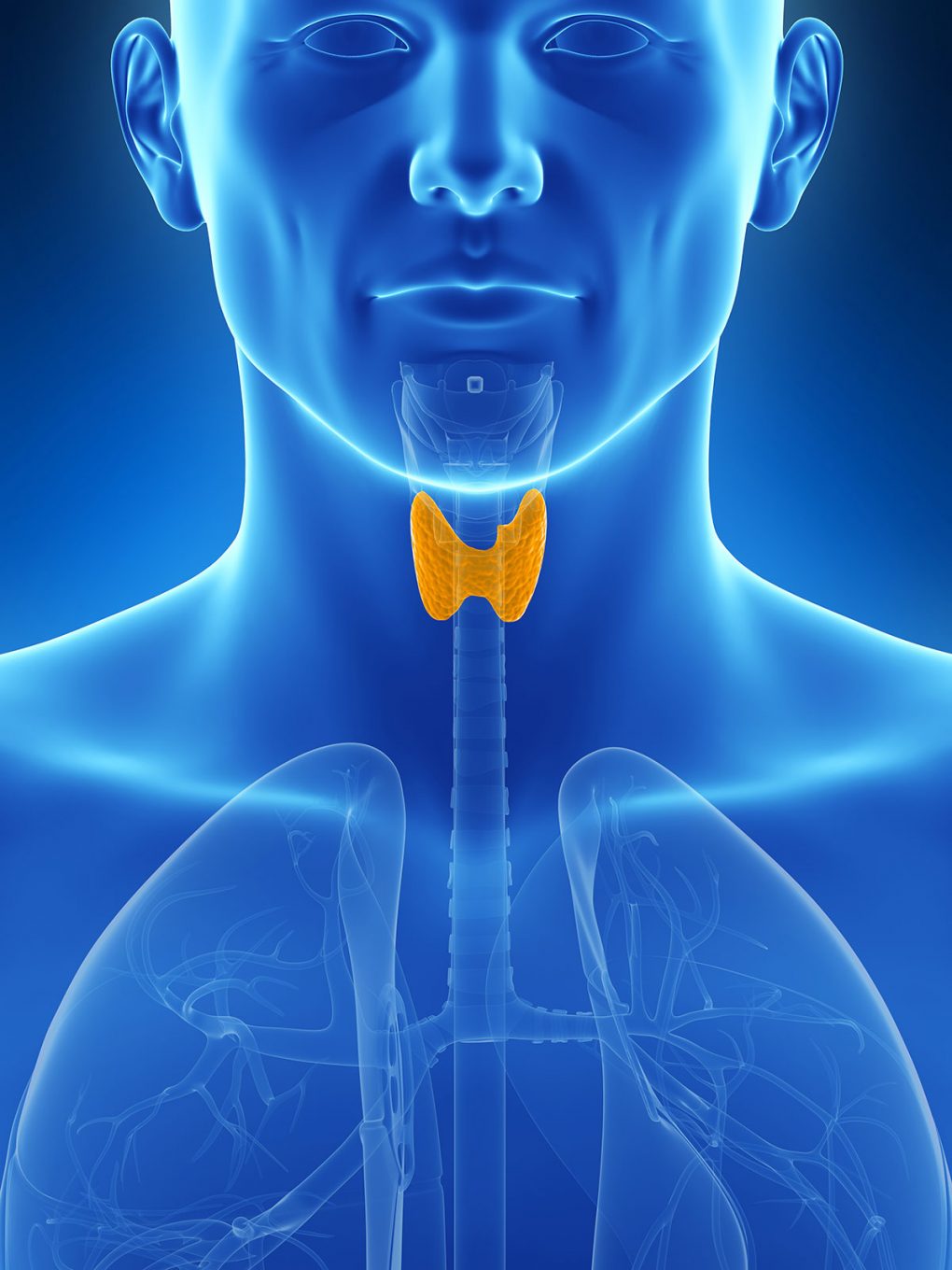
THYROID – THE BASICS
The thyroid is a gland of internal secretion, which is located in the front of the neck. The gland itself is small, but its role huge.
It has become the subject of many discussions lately, as, unfortunately, the number of people with disorders of the thyroid gland grows.
The thyroid gland, according to the research available to date, produces three hormones:
> Calcitonin – its role in the hormonal system is marginal; is important for calcium-phosphate homeostasis
> T4 (thyroxine) – a “storage” hormone of sorts; its main function is to be converted to triiodothyronine
> T3 (triiodothyronine) – one of the main regulators of the basic metabolic rate. It acts through the direct stimulation of the cell receptors located in peripheral tissues. Moreover, it stimulates the hypothalamic centers which activate the adrenergic system.
One of the main effects of thyroid hormones at work is increasing the activity of catabolic processes, which results in an increased release of energy used mainly in the process of thermogenesis. The target organ, which is the main energy generator, are the skeletal muscles.
Another major effect thyroid hormones are responsible for is the stimulation of food intake. In the hypothalamus, T3 acts as an activator of neurons containing neuropeptide Y, which takes part in stimulating the appetite center, which inhibits the activity of anorexigenic neurons.
Thyroid hormones also have other prometabolic effects, such as stimulating the body to release significant amounts of energy substrates, that is, glucose and free fatty acids. Thus, thanks to triiodothyronine, the following can occur: increase in gluconeogenesis and glycogenolysis, and increased expression of glucose transporter GLUT4, whose activity determines the amount of glucose that goes to the muscles. Furthermore, fatty (adipose) tissue witnesses the activation of lipolysis and the release of free fatty acids.
On top of that, thyroid hormones stimulate the motility of the digestive tract, which along with increased appetite affects the rate food is delivered where it needs to be.
The aforementioned constitute only the most important functions of the thyroid gland, but having familiarized yourself with them, I’m sure you see now why this gland is so essential when it comes to the quality of your life.
Most thyroid hormones are protein-bound (inactive). Various factors may influence protein concentration and because of this the process of diagnosis also involves performing the free thyroxine (FT4) and (FT3) free triiodothyronine tests.
What’s more, as far as the production of hormones and growth are concerned, the thyroid-stimulating hormone (TSH), a pituitary hormone, has the most significant role to play. Its secretion is inhibited by thyroid hormones (local FT3 concentration) in a negative feedback regulatory mechanism. Therefore, when there is an excess of thyroid hormones, the TSH concentration decreases, and the other way around – when there’s a deficiency, it increases.
It’s important to always do a checkup of everything thyroid-related, i.e., T4 and T3 – both total and free, TSH, and the following antibodies: TPO and TG. A large percentage of thyroid diseases is autoimmunological and it’s crucial to know whether your thyroid problems do not happen to be connected with the immune system, as, when this is the case, different treatment methods are applied. Just as important is estimating your body’s ability to convert T4 to T3 before administering artificial T4, which will not solve the problem, because T3 is still not being properly formed in your body.
Impaired thyroid hormone function may result from:
- abnormal intestinal flora. Part of T4 is converted to T3 by intestinal enzymes
- liver overload – 60% of T4 hormones is converted to T3 in the liver
- impaired adrenal gland function
- excess of toxins, alcohol, drugs
- nutrient deficiency
- immune system diseases
Therefore, a good diagnostician will thoroughly analyze your medical history and will perform a series of tests before determining the cause of the thyroid gland dysfunction and developing treatment plan. Remember here that you shouldn’t rely on online diagnosis or other information you can find on the Web, because both the levels and the proportions of thyroid hormones and TSH differ greatly from one individual to another. Besides, abnormal test results do not necessarily have to spell thyroid disease, but may be related to, e.g., adrenal gland disorder.
I will continue writing about thyroid, also in the context of autoimmune diseases, such as Hashimoto’s disease.










Comments No Comments
Join the discussion…